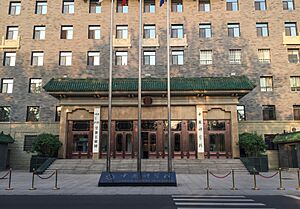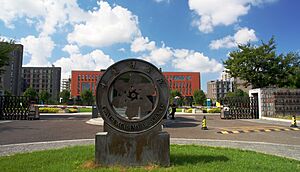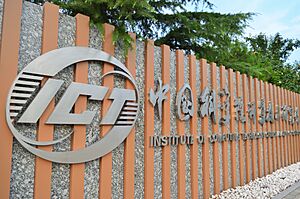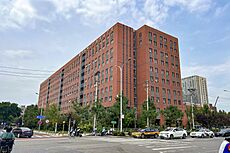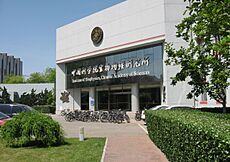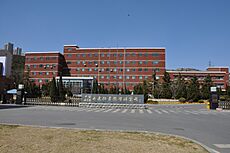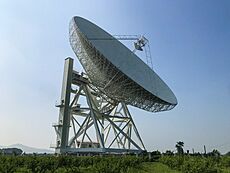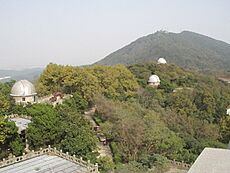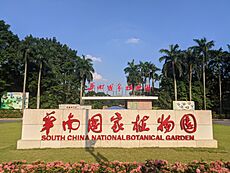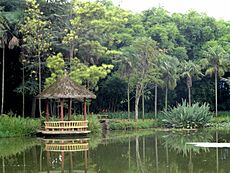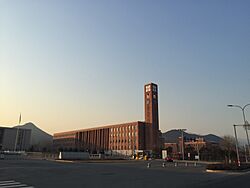Chinese Academy of Sciences facts for kids
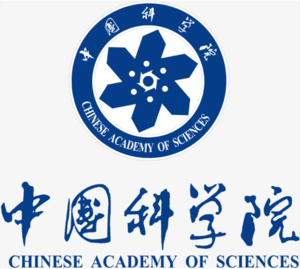
Seal of the Academy
|
|
| Other name | 中国科学院 (Native Name) |
|---|---|
| Parent institution | State Council of China |
| Founder(s) | Government Administration Council of the Central People's Government (emerged to the State Council in 1954) |
| Established | 1 November 1949 |
| Focus | Natural sciences |
| President | Hou Jianguo |
| Staff | 71,300 (2023) |
| Key people | Wu Zhaohui, Vice President |
| Budget | CN¥171 billion (2023) |
| Subsidiaries | See list |
| Formerly called | Academia Sinica (1949–1980s) |
| Location |
Nationwide
,
|
| Address | 52 Sanlihe Rd, Xicheng, Beijing, China |
| Chinese Academy of Sciences | |||||||
|---|---|---|---|---|---|---|---|
| Simplified Chinese | 中国科学院 | ||||||
| Traditional Chinese | 中國科學院 | ||||||
|
|||||||
The Chinese Academy of Sciences (CAS; Chinese: 中国科学院) is China's main national academy for natural sciences. It is also the top advisor for science and technology in the People's Republic of China. CAS is the largest research organization in the world. It has 106 research centers, two universities, and over 71,000 full-time employees. About 79,000 graduate students also study there.
The Chinese Academy of Sciences started from an older group called Academia Sinica. It was even known by that name until the 1980s. The academy acts like a national science "think tank." This means it gives advice and helps evaluate ideas about the country's economy, how society is changing, and new science and technology. Its main office is in Beijing, but it has many other centers all over China. CAS has also helped create many businesses, including the famous computer company Lenovo.
CAS also runs two important universities: the University of Science and Technology of China and the University of the Chinese Academy of Sciences. Both of these universities were ranked among the top three academic places in the world by the Nature Index in 2024.
Contents
Becoming a Member
Being a member of the Chinese Academy of Sciences is a special honor for Chinese scientists. These members are called "Academicians of the Chinese Academy of Sciences" (Chinese: 中国科学院院士). This title is given to scientists who have made very important discoveries in different fields. It is considered the highest academic title in China.
To become a formal member, a scientist must be a Chinese citizen. However, scientists from other countries can be chosen as "foreign academicians." Members who are older than 80 are called "senior members." They no longer hold leadership roles in the organization.
Academicians have important jobs. They help science and technology grow in China. They also encourage good scientific practices and help train new scientists. They attend meetings and give advice on important science projects. They also help with international science projects and working with other countries. Academicians can even give ideas that influence China's government policies about science and technology.
A Look at History
In 1956, China officially started its computer program. The Chinese Academy of Sciences created the Beijing Institute of Computing Technology. This was part of a big plan for science that would last 12 years.
In 1964, CAS showed off China's first large digital computer, called the 119. This computer was very important. It helped China successfully test its first nuclear weapon in the same year.
Starting in 1972, CAS began to focus on two things. They wanted to balance practical research with more theoretical research. They also wanted to share scientific ideas with other developing countries.
In 1975, a leader named Deng Xiaoping also wanted CAS to focus more on theoretical research. This kind of research had not been a main focus during the Cultural Revolution. Deng famously said that "the Academy of Sciences is an Academy of Sciences, not an Academy of Cabbage." He wanted CAS to be a serious scientific group.
Deng asked Hu Yaobang, a vice president at CAS, to create a plan to improve the academy. Deng and his helper, Hu Qiaomu, worked on this plan. In September 1974, they released "The Outline Report on the Work of the Academy of Sciences." This report said that China's science was behind other advanced countries. To catch up, China needed to focus on basic science. This would build a strong foundation of knowledge.
This idea for science reform became less popular in 1976 when Deng Xiaoping lost his power for a short time. However, many people within CAS still supported it. A month before Deng returned to power in 1977, the Outline Report was brought back. It became the official policy for CAS.
Soon after Deng returned, he held meetings about science and education. He said that science should lead China's modernization. After this, CAS set goals for natural sciences to reach by 1985. They said that China, as a developing country, should make basic scientific research stronger by working with other countries.
To help this goal, Deng started a campaign for the National Science Conference. A team led by CAS vice president Fang Yi told schools, factories, and communities to hold events for young people. These events celebrated science and technology.
In 1977, the Department of Philosophy and Social Sciences separated from CAS. It became a new group called the Chinese Academy of Social Sciences.
The Graduate School of the Chinese Academy of Sciences was started in 2001. It was a new version of an older school. In 2012, this school changed its name to the University of the Chinese Academy of Sciences (UCAS).
How CAS is Organized
The Chinese Academy of Sciences has many different groups and centers all across China.
Main Departments
CAS has several main departments at its headquarters. These departments help manage all the different parts of the academy. Some of these include:
- Office of the Chinese Academy of Sciences
- Bureau of Academic Departments
- Bureau of Frontier Science and Basic Research (for new and basic science)
- Bureau of Major Science and Technology Tasks (for big science projects)
- Bureau of Sustainable Development Research (for environmental and long-term studies)
- Bureau of International Cooperation (for working with other countries)
- Personnel Bureau (for staff)
Research Centers Across China
CAS has many research centers in different cities. Here are some examples:
Beijing Centers
- Academy of Mathematics and Systems Science
- Institute of Physics
- Institute of High Energy Physics
- Institute of Mechanics
- Institute of Chemistry
- National Astronomical Observatory
- Institute of Vertebrate Paleontology and Paleoanthropology (studies ancient animals and humans)
- Institute of Botany
- Institute of Zoology
- Institute of Computing Technology
- Institute of Software Research
Shenyang Branch
- Institute of Metals
- Shenyang Institute of Applied Ecology (studies how living things interact with their environment)
- Dalian Institute of Chemical Physics
Shanghai Branch
- Shanghai Institute of Microsystems and Information Technology
- Shanghai Institute of Optical Precision Machinery
- Shanghai Astronomical Observatory
- Center of Excellence for Molecular Cell Science
- Innovation Center of Excellence in Brain Science and Intelligent Technology
Nanjing Branch
- Nanjing Institute of Geology and Paleontology (studies ancient life and rocks)
- Purple Mountain Observatory
- Suzhou Institute of Nanotechnology and Nanobionics (studies very tiny materials)
Wuhan Branch
- Wuhan Institute of Virology (studies viruses)
- Institute of Aquatic Biology (studies life in water)
- Wuhan Botanical Garden
Guangzhou Branch
- South China Sea Institute of Oceanography (studies the ocean)
- South China Botanical Garden
- Guangzhou Institute of Biomedicine and Health
Chengdu Branch
- Chengdu Institute of Biology
- Chengdu Institute of Mountain Hazards and Environment
Kunming Branch
- Kunming Institute of Zoology
- Kunming Institute of Botany
- Xishuangbanna Tropical Botanical Garden
Xi'an Branch
- Xi'an Institute of Optical Precision Machinery
- National Timing Center (helps keep time accurately)
Lanzhou Branch
- Institute of Modern Physics
- Lanzhou Institute of Chemical Physics
Xinjiang Branch
- Xinjiang Institute of Ecology and Geography
Universities Under CAS
CAS directly manages two important universities:
- University of Science and Technology of China
- University of Chinese Academy of Sciences
Other Support Units
CAS also has groups that help with its work, like:
- Computer Network Information Center
- Documentation and Intelligence Center (which is like a big science library)
- China Science Daily (a newspaper about science)
Businesses Connected to CAS
Some businesses are owned or controlled by CAS. These include:
- Chinese Academy of Sciences Holdings Limited
- Legend Holdings (which owns Lenovo)
- China Science & Technology Publishing & Media Group
Scientific Honesty
In 2007, CAS released a "Declaration of Scientific Ideology." This was a set of rules to make sure scientific research in China was open, fair, and responsible. They also created a group to check for scientific honesty. Around the same time, the Ministry of Science and Technology also started taking steps to deal with bad behavior in science projects funded by the government.
CAS also publishes an "Early Warning List." This list points out journals that might not be very strict or could be involved in unfair practices.
Awards and Recognition
Since 1999, CAS has given out the annual State Preeminent Science and Technology Award. This is a very important award given by the President of China to top scientists.
CAS has been ranked as the number one research institute in the world by Nature Index every year since 2014. It was also the most productive organization for publishing articles about sustainable development between 1981 and 2018.
In 2024, a list called "Clarivate's Highly Cited Researchers" included 308 CAS members. This made CAS researchers the largest group from any single organization on the list.
Working with Other Countries
The Institute of Remote Sensing and Digital Earth is a part of CAS. This institute used to work with the Swedish Space Corporation (SSC). SSC helps send data from satellites to Earth. However, in 2020, SSC decided not to continue its contracts with China for operating Chinese satellites.
See also
 In Spanish: Academia China de Ciencias para niños
In Spanish: Academia China de Ciencias para niños
- Academia Sinica
- Chinese Academy of Engineering
- Chinese Academy of Social Sciences
- University of Chinese Academy of Sciences
- University of Science and Technology of China
- Academician of the Chinese Academy of Sciences
 | Kyle Baker |
 | Joseph Yoakum |
 | Laura Wheeler Waring |
 | Henry Ossawa Tanner |


